Which is the best project management certification? A comprehensive review for 2024
By Remy Meraz • June 13, 2023
Key Takeaways
- Project management certifications enhance credibility, skills, and career prospects.
- The Project Management Institute (PMI) offers globally recognized certifications like PMP and CAPM.
- Different certifications are suitable for different career stages and industry focuses.
- Factors like industry, experience, organizational methodologies, and long-term goals influence the best certification choice.
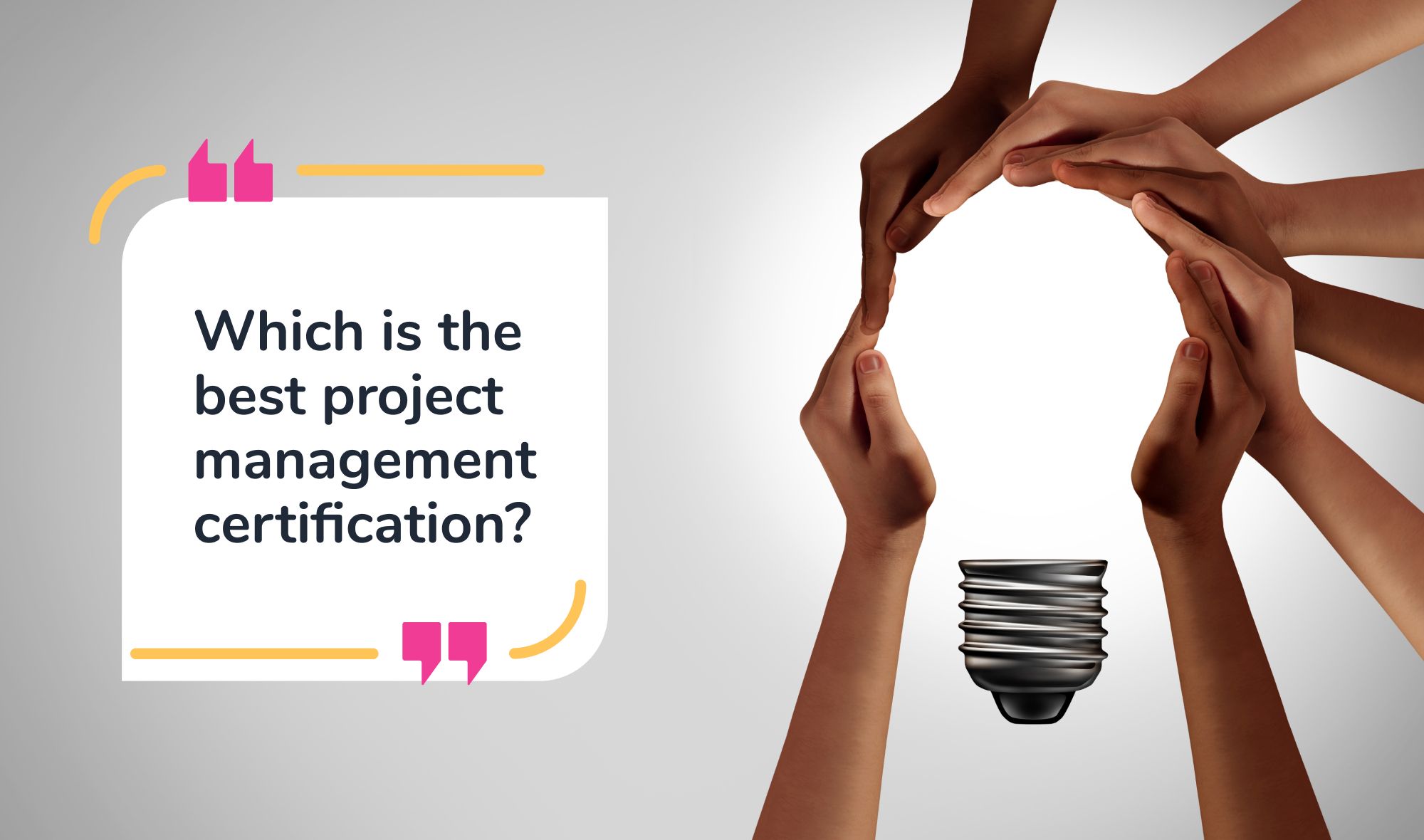
Which is the best project management certification? A comprehensive review for 2024
In today's fast-paced and dynamic business environment, the demand for skilled project managers who can effectively navigate complex projects and multiple projects simultaneously has soared. The cornerstone of an excellent project manager's portfolio isn't just project management experience, but a seal of credibility in the form of project management certification. These certifications not only validate the project manager's project management skills, but they also affirm their commitment to the profession, fortifying their project management education along the way.
2024 marks yet another year where the field of project management continues to evolve, bringing forth new methodologies, tools, and strategies. With these advancements, project managers are called upon to continuously learn, adapt, and grow. The role of project management certifications plays a vital part in this process, providing a structured learning path that equips professionals with the necessary skills to meet contemporary business challenges.
In this comprehensive review, we dive into the sea of certifications, dissecting and evaluating each one to help you answer the pivotal question: "Which is the best project management certification for me in 2024?" From Associate in Project Management to Certified Project Director, from Agile Project Management to the Certified Associate in Project, and the globally renowned Project Management Professional (PMP) – we'll cover them all.
Whether you're a seasoned project manager seeking a higher rung on the career ladder or a novice keen to make your mark in the project management space, this review promises insightful, practical guidance. The right certification could be the catalyst that propels your project management career to the next level. So, buckle up as we embark on this journey, guiding you towards making an informed decision in your professional development.
Let's get started on this voyage of discovery in the realm of project management certifications.
Join our Newsletter
Transform your career with our personal growth insights. Get one valuable tip right in your inbox every Saturday morning.
Why choose a project management certification?
There are ample reasons to pursue a project management certification, irrespective of whether you are a novice stepping into the realm of project management or an experienced project manager aiming to bolster your credentials. Here, we dive into the compelling benefits of becoming a certified project management professional.
The Credibility Advantage
First and foremost, a project management certification boosts your credibility. It's not merely a certificate; it's a testament to your commitment, expertise, and project management skills. It tells potential employers that you have invested in your project management education, you understand project management fundamentals, and you can apply project management methodologies effectively. When you're a certified project manager, you're viewed as a dedicated professional with an extensive understanding of the project management space.
Career Growth and Better Salary Prospects
The "Project Management Salary Survey – Eleventh Edition" published by the Project Management Institute (PMI) reports that certified project management professionals earn approximately 20% more than their uncertified counterparts. Being certified opens the door to higher-level positions, with businesses frequently listing a project management certification as a preferred or required qualification.
Mastery of Global Project Management Practices
By obtaining a project management certification, you acquire a global language of project management principles, tools, and practices. You learn to navigate complex projects and manage multiple projects simultaneously. This mastery helps you communicate effectively with other project managers and stakeholders, no matter where they are located. This global understanding is a massive advantage in today's interconnected business world.
Enhanced Knowledge and Skills
A project management certification ensures you are up-to-date with the latest trends, technologies, and best project management certifications. It equips you with the skills to handle different project management methodologies, business value-oriented principles, and risk management strategies. You will be adept at managing projects of all sizes, from simple project basics to the most complex projects.
Greater Marketability
In today's competitive job market, it's essential to stand out. A project management certification on your resume can be the distinguishing factor that sets you apart from other candidates. It signifies to employers that you possess a robust project management education, significant project management experience, and the capability to add value to their organization.
Choosing the best project management certification is a strategic career decision that can lead to a multitude of opportunities. In the next sections, we'll guide you through the leading certifications, helping you select the one that aligns best with your career objectives and aspirations.
Overview of the Project Management Institute
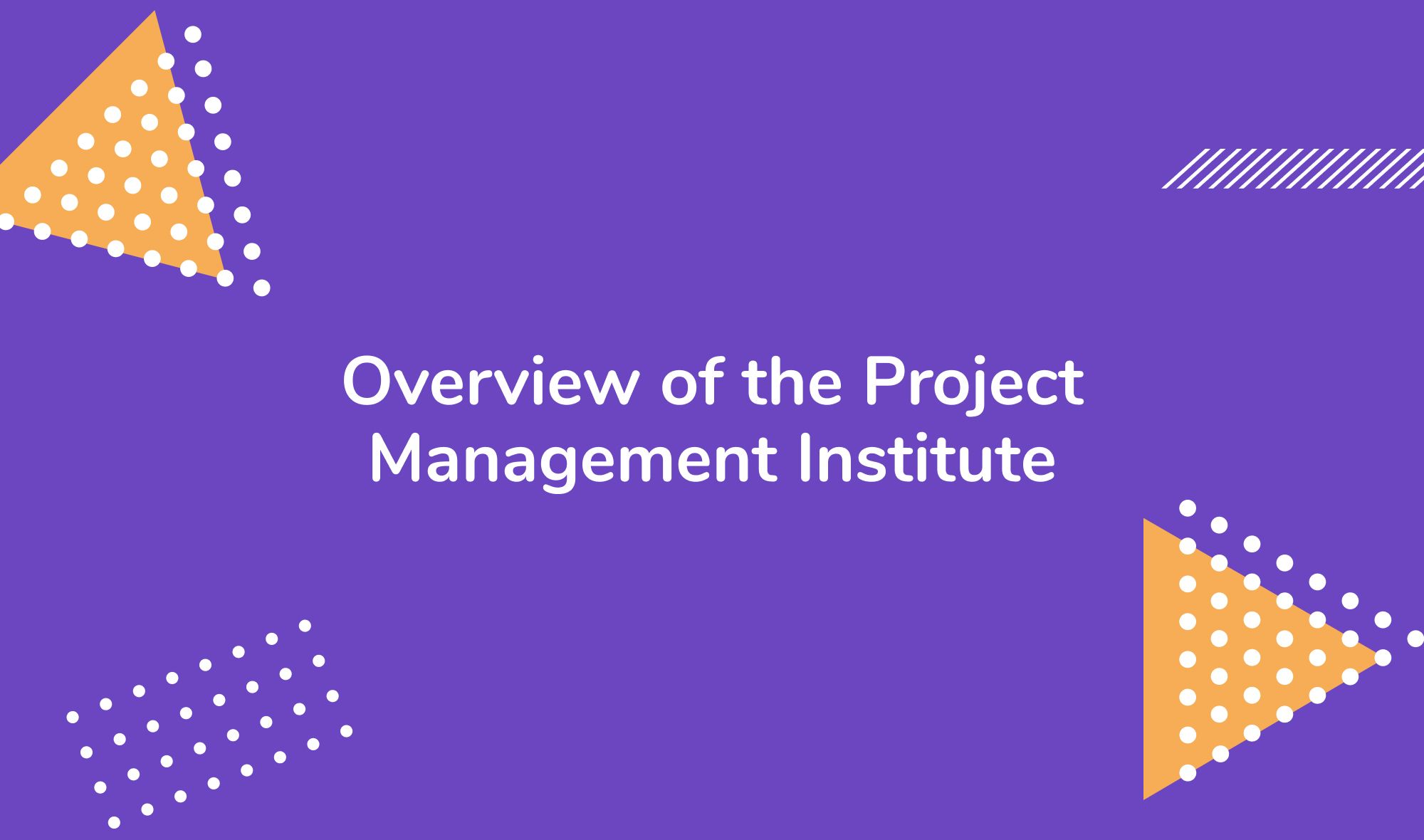
An indispensable part of the project management world is the Project Management Institute (PMI). As we explore the various certifications available, understanding PMI's role and its impact on the global project management scene is crucial.
The Global Project Management Powerhouse
Founded in 1969, PMI is a global association that champions project management, offering a broad spectrum of certifications beyond the renowned Project Management Professional (PMP) certification. Their certifications are globally recognized and sought after by project managers worldwide, from the Certified Associate in Project Management (CAPM) to the Program Management Professional (PgMP), and even specialized ones like PMI Risk Management Professional (PMI-RMP) and Agile Certified Practitioner (ACP).
Setting Standards in Project Management
One of PMI's most significant contributions is the establishment of standards in the project management space. Their "A Guide to the Project Management Body of Knowledge" (PMBOK Guide) is a globally acknowledged gold standard, outlining a set of standard terminology and guidelines for project management.
Advocating Professional Development
PMI also encourages continual learning and professional development through its Professional Development Units (PDUs) requirements. Certified project management professionals must earn PDUs over a specific period to maintain their certification status, ensuring they stay up-to-date with evolving project management methodologies and practices.
Offering Comprehensive Resources
From offering project management training and project management certification courses to conducting research, hosting global events, and providing resources for project management education, PMI's influence spans across various aspects of project management. They also publish a range of influential reports and thought leadership articles that shape the project management landscape.
The PMI is not just a certification-granting body but a comprehensive resource center for project managers. Whether you are seeking certification, furthering your project management education, or seeking to network with fellow project managers, PMI's role is invaluable. It is this unique positioning that has helped PMI make a substantial impact on the global project management scene, providing professionals with a platform for growth, learning, and networking opportunities.
Different types of project management certifications
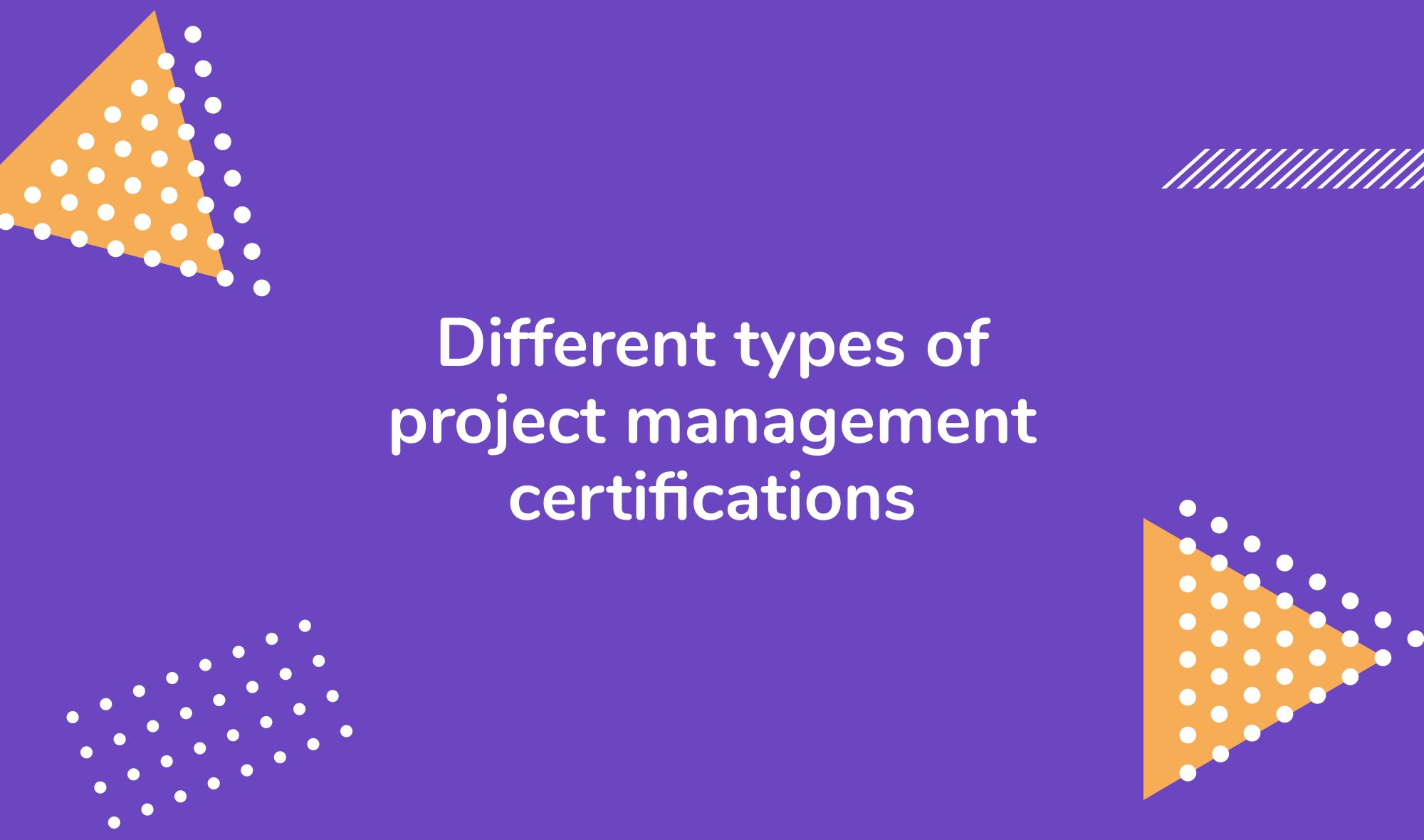
The field of project management is diverse, with a broad spectrum of certifications to cater to various career goals, skill levels, and specializations. As we delve into 2024, let's take a comprehensive look at the different types of project management certifications available to project managers today.
Entry-Level Certifications
Entry-level certifications, such as the Certified Associate in Project Management (CAPM) and the AIGA Project Management Certificate, are perfect starting points for beginners. The CAPM certification requires a secondary degree (high school diploma or equivalent) and 23 hours of project management education. These certifications provide basic project management knowledge and equip you with the project management basics to manage projects effectively.
Mid-Level Certifications
For project managers with a few years of experience under their belt, certifications like the Project Management Professional (PMP) and the Certified Project Manager (IAPM) are suitable choices. These certifications require project management experience and formal education, with the PMP demanding at least 35 hours of project management education.
Specialized Certifications
Project management encompasses various domains, and certain certifications cater to these specializations. For instance, the Agile Certified Practitioner (ACP) is suitable for project managers working with agile methodologies. The PMI Risk Management Professional (PMI-RMP) focuses on specialized risk management skills, and the Certified Project Management Practitioner (CPMP) is intended for project managers keen on mastering project documentation and other project management tools.
Advanced Certifications
For senior project managers with substantial project management experience, the Program Management Professional (PgMP), Portfolio Management Professional (PfMP), and the Certified Project Director (CPD) are appropriate choices. These certifications require not only a significant amount of cumulative project management experience but also the ability to manage complex projects and portfolios.
Domain-Specific Certifications
Certain certifications are industry-specific, such as the BVOP Certified Project Manager for business value-oriented principles, or the Certified Construction Project Manager (CCPM) for those in the construction industry.
Choosing the right certification depends on where you are in your project management career and where you want to be. As we delve deeper into each of these certifications, you will gain more insight into what each offers and how it can shape your project management career.
Analyzing the top project management certifications for 2024
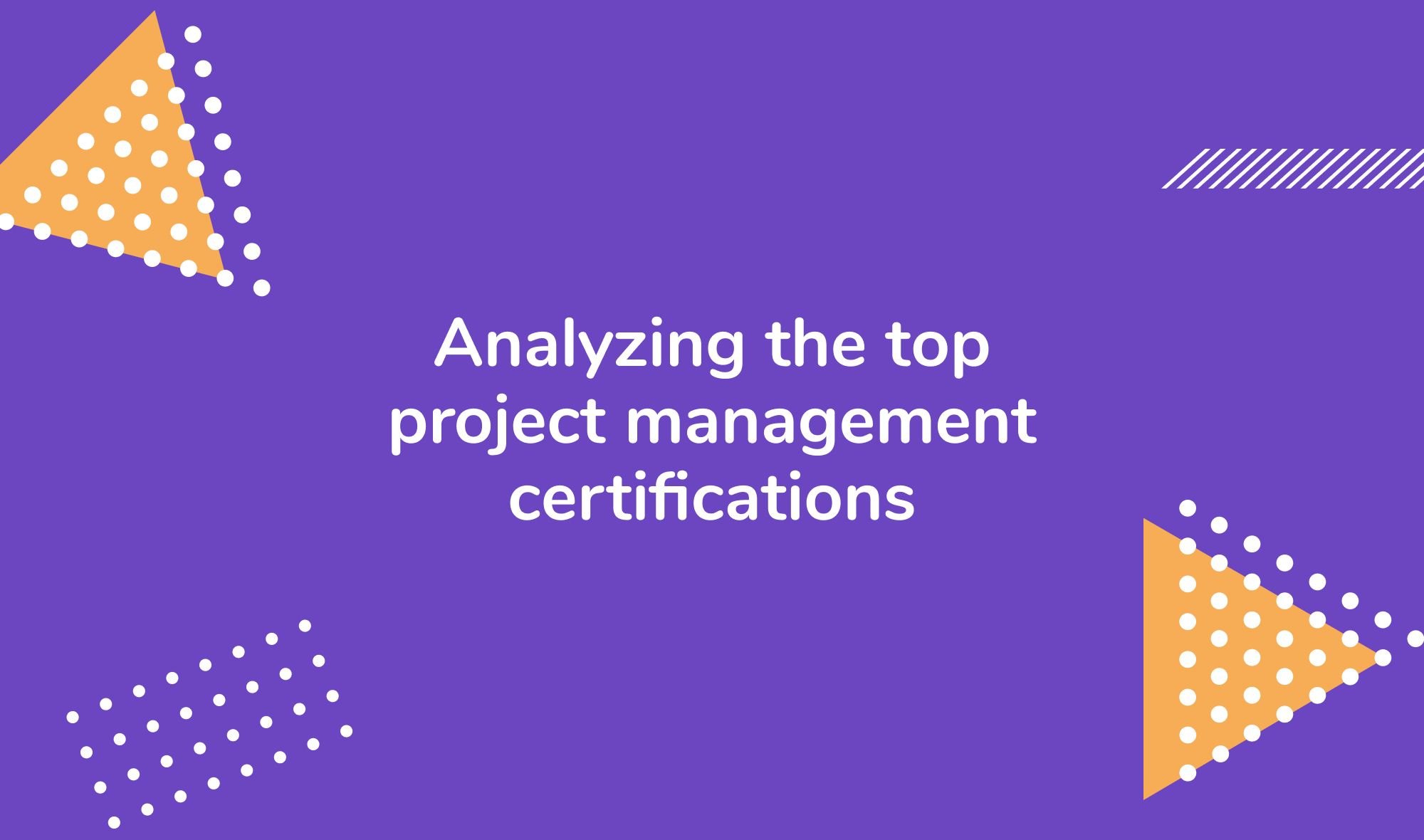
As you consider expanding your project management skills, choosing the right certification can be a game-changer. To help you make an informed decision, we are conducting a comparative study of the top project management certifications for 2024, delving into their benefits, requirements, and unique offerings.
Project Management Professional (PMP)
The Project Management Professional certification, offered by the Project Management Institute (PMI), is a globally recognized credential that signifies a high level of project management knowledge and expertise. PMP certification requires a secondary degree, 7,500 hours of project management experience, and 35 hours of project management education, or a four-year degree, 4,500 hours of project management experience, and 35 hours of project management education.
Certified Associate in Project Management (CAPM)
The Certified Associate in Project Management is an entry-level certification, also offered by PMI, that's suitable for individuals seeking to gain fundamental knowledge in project management. CAPM certification requires a high school diploma or equivalent and 23 contact hours of formal education in project management.
Program Management Professional (PgMP)
The Program Management Professional certification is ideal for project managers who manage multiple, related projects. This PMI certification validates advanced capability in coordinating multiple projects to achieve strategic and business objectives. PgMP certification requires a secondary degree, 6,000 hours of project management experience, and 6,000 hours of program management experience, or a four-year degree, 6,000 hours of project management experience, and 10,500 hours of program management experience.
Agile Certified Practitioner (ACP)
For project managers who primarily work in an Agile environment, the Agile Certified Practitioner certification offered by PMI is an excellent choice. The ACP certification validates the holder's understanding of Agile principles and their ability to apply Agile methodologies to projects. It requires 2,000 hours of general project management experience, an additional 1,500 hours of Agile project experience, and 21 contact hours in Agile practices.
Join our Newsletter
Transform your career with our personal growth insights. Get one valuable tip right in your inbox every Saturday morning.
Certified Project Management Practitioner (CPMP)
The CPMP certification, offered by the EC-Council, is intended for project managers who wish to gain expertise in managing projects using EC-Council's ECPM framework. This certification requires two years of work experience in project management or a four-year degree plus one year of work experience in project management.
Each of these certifications holds its unique benefits, requirements, and focus areas. As we delve deeper into the world of project management certifications, it's essential to choose the one that aligns best with your career goals, current experience level, and the type of projects you'll be managing. The right certification can be a significant milestone in your project management journey.
What is the best project management certification?
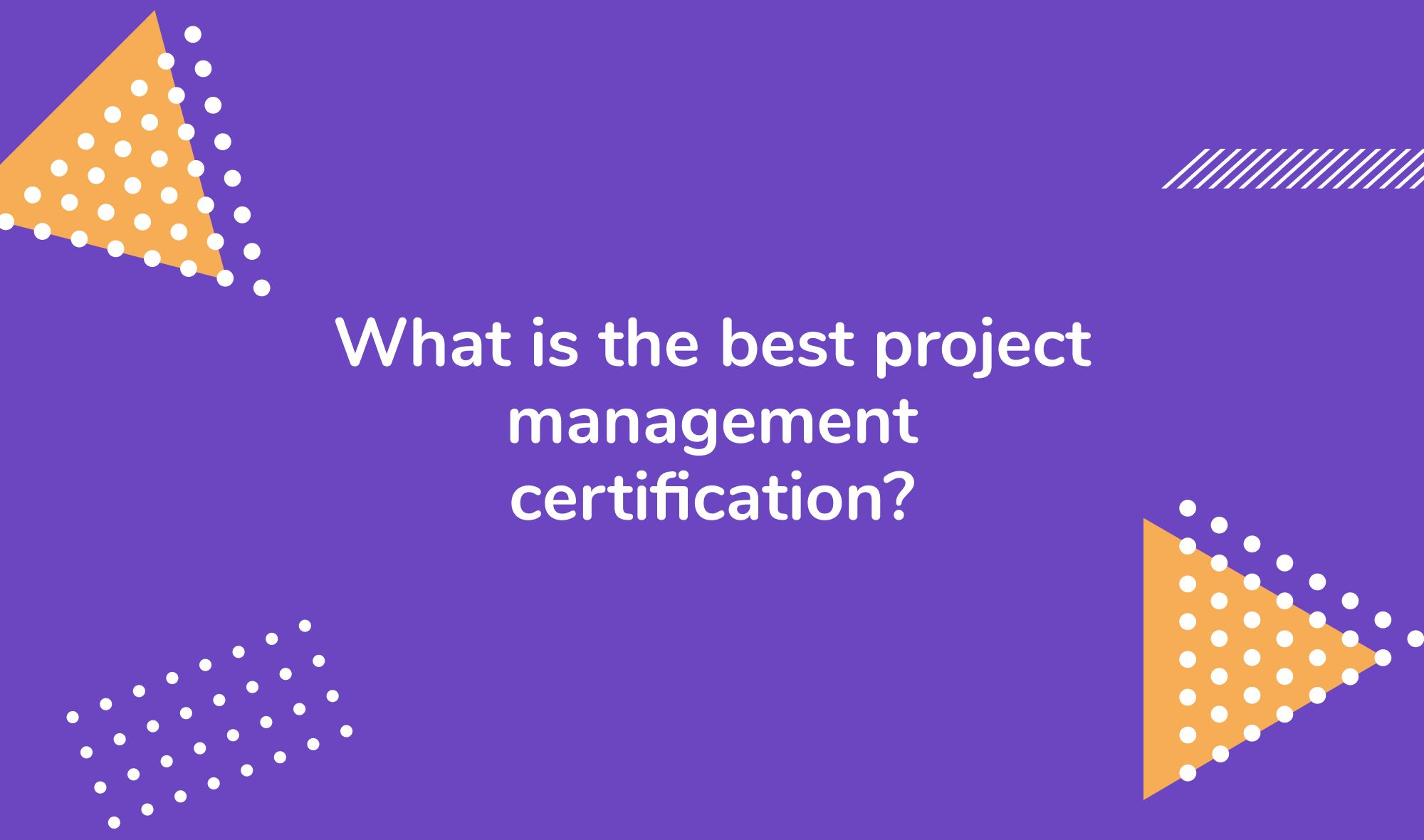
Determining the "best" project management certification is subjective as it depends largely on individual career goals, experience levels, and areas of interest. Here, we will discuss key factors to consider to evaluate which project management certification would be the best fit for your career needs.
Looking for more insights? Don't miss our extensive FAQs on life and career coaching.
Consider Your Career Goals
Your choice of certification should align with your long-term career goals. If you aim to be a senior project manager or program manager, certifications such as the Program Management Professional (PgMP) or the Certified Project Director (CPD) could be suitable. If you're at the beginning of your project management journey, the Certified Associate in Project Management (CAPM) could be a good starting point.
Assess Your Experience Level
Your current experience in project management also plays a crucial role. Certifications such as the Project Management Professional (PMP) and Program Management Professional (PgMP) require substantial project management experience. On the other hand, the Certified Associate in Project (CAPM) is more suited to those with less experience but who still want to enhance their project management skills.
Understand the Prerequisites
Every certification comes with its set of prerequisites, which may include a certain level of education, project management experience, and project management education hours. Ensure you meet these prerequisites before opting for a specific certification.
Review the Exam Format
Examinations for these certifications vary. Some might focus more on theoretical knowledge, while others may test practical knowledge and application of project management principles. Understanding the exam format and aligning it with your strengths can contribute to your success.
Factor in Maintenance Requirements
Once you earn a certification, you usually need to maintain it through Professional Development Units (PDUs) or Continuing Education Units (CEUs). Check the maintenance requirements for each certification to ensure it fits with your schedule and professional development goals.
Check Industry Demand
Look into the demand for certain certifications within your industry. While the PMP is highly recognized across various sectors, certifications like Agile Certified Practitioner (ACP) may be more sought after in industries like IT and software development.
Reflect on Your Interest in Specializations
If you have a keen interest in specific areas of project management such as risk management, quality management, or Agile practices, consider specialized certifications like the PMI Risk Management Professional (PMI-RMP) or Agile Certified Practitioner (ACP).
In conclusion, there isn't a "one-size-fits-all" answer to the question, "What is the best project management certification?" The best certification for you would depend on a mix of your career goals, experience level, educational background, and personal interests within the project management field.
Breaking down the best PMP certification
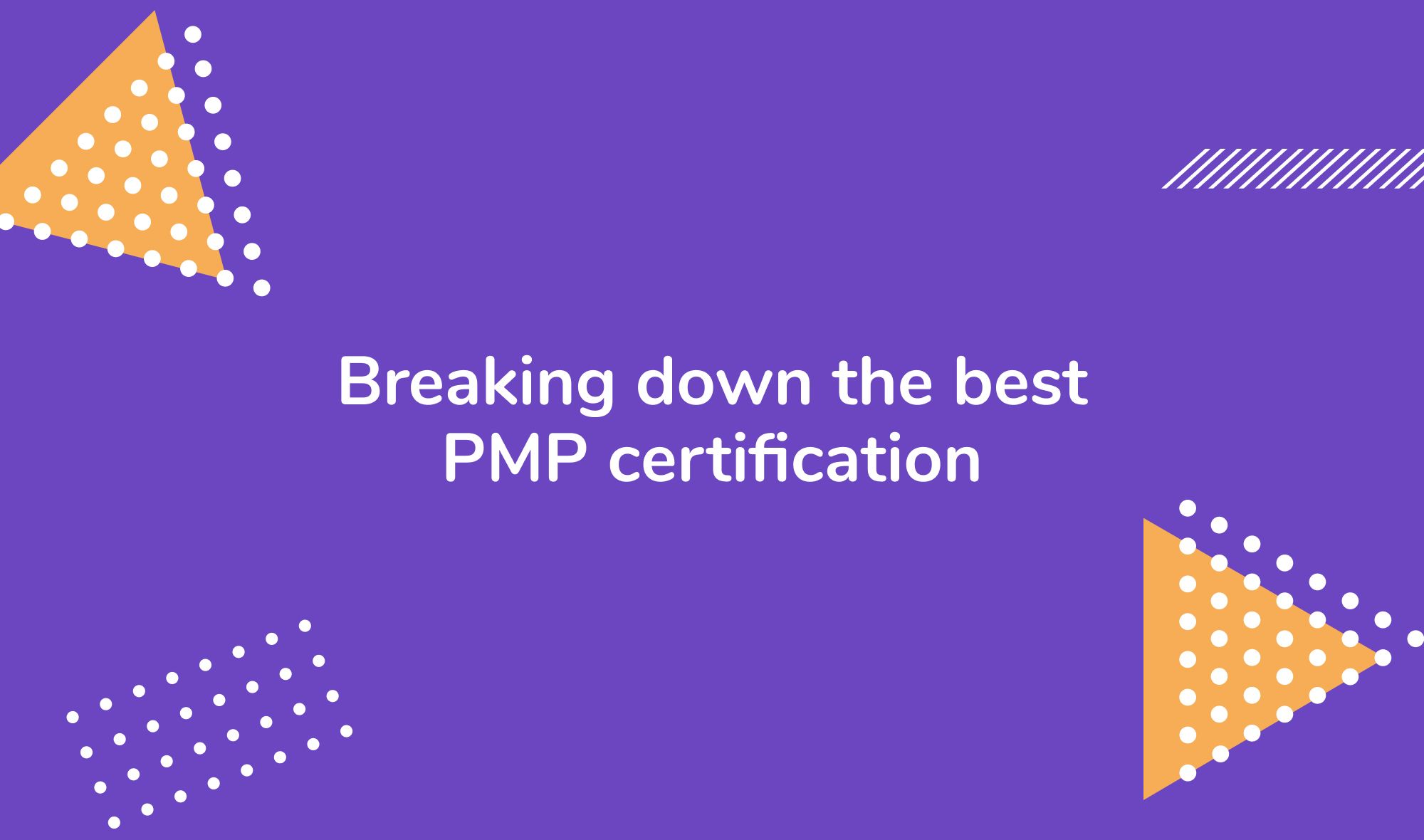
Among various project management certifications, the Project Management Professional (PMP) stands out as one of the most recognized and highly valued. Offered by the Project Management Institute (PMI), it has become a gold standard in project management certifications. Let's take a closer look at what makes PMP the top choice for many project managers.
Globally Recognized
One of the standout features of the PMP certification is its global recognition. Regardless of the industry or the country, the PMP certification is respected and recognized, enhancing your credibility as a project manager anywhere in the world.
Rigorous Standards
The PMP certification is not easy to earn, which adds to its value. It requires significant project management experience and education, followed by a challenging examination that tests the depth and breadth of your project management knowledge and understanding.
Comprehensive Coverage
The PMP examination covers all aspects of project management, including initiating, planning, executing, monitoring, controlling, and closing projects. This comprehensive coverage ensures that PMP-certified project managers are well-equipped to manage projects of any size and complexity.
Increased Earning Potential
Numerous studies and surveys show that PMP-certified project managers often command higher salaries compared to their non-certified counterparts. The PMP certification, thus, can lead to better job prospects and increased earning potential.
Continuous Learning
Earning the PMP certification is not the end of the journey. PMI requires PMP-certified professionals to earn Professional Development Units (PDUs) to maintain their certification. This requirement ensures that PMP-certified professionals are always up-to-date with the latest trends and developments in project management.
In conclusion, the PMP certification, with its global recognition, rigorous standards, comprehensive coverage, and focus on continuous learning, has rightly earned its place as one of the best project management certifications available today. Whether you're an experienced project manager looking to advance your career or a professional keen on moving into project management, the PMP certification can provide a significant boost to your professional journey.
Final thoughts: Choosing your project management certification
In the world of project management, there is no one-size-fits-all certification. The most suitable certification depends on a variety of factors, including your personal career goals, industry demands, level of experience, and even the specific methodologies used by your organization.
As you reflect on your career goals, ask yourself these questions:
- What industry am I working in or plan to work in? The best certification for an IT project manager might differ from someone working in construction or healthcare. Certain certifications are more recognized in specific industries. Understanding industry standards and expectations is crucial.
- What is my current level of experience? If you're just starting your project management career, an entry-level certification like the CAPM can provide you with a solid foundation. On the other hand, experienced project managers may want to consider advanced certifications like the PMP or PgMP.
- What methodologies does my organization use? If your organization primarily uses Agile methodologies, then a Scrum or Agile-specific certification could be beneficial. Conversely, if your organization uses traditional project management methodologies, then a certification like the PMP might be more suitable.
- What are my long-term career goals? If you aim to become a program manager, then you might consider the PgMP certification. Similarly, if you aspire to specialize in IT or risk management, then a specialized certification in those areas might be worth considering.
Remember, earning a project management certification is an investment of both time and money. It's essential to carefully consider which certification is most likely to bring you a significant return on your investment in terms of career advancement, salary increases, and enhanced credibility.
Whichever certification you choose, the journey of preparing for and earning a project management certification is likely to enrich your understanding of project management principles, broaden your skill set, and enhance your credibility as a project manager. Good luck on your journey!
Read more about: Professional Development
About Remy Meraz
Remy Meraz, co-founder, and CEO of Zella Life, is a visionary leader who leveraged corporate glass ceiling challenges as a woman of color to drive systemic change.
While leading and cultivating high-performance teams from VC-backed startups to Fortune 500, she consistently faced obstacles such as inadequate mentorship, lack of psychological safety, and non-personalized training. Taking matters into her own hands, she turned to executive coaching and NLP training. This life-changing growth experience led to breaking leadership barriers and a passion for cognitive psychology.
Motivated by her experiences, she co-founded Zella Life, an innovative AI-driven coaching platform bridging the talent development gap by enhancing soft skills and emotional intelligence (EQ) in the workplace.
Her vision with Zella Life is to transform professional development into an inclusive and impactful journey, focused on the distinct needs of both individuals and organizations. She aims to promote advancement and culture change by ensuring every professional's growth is acknowledged and supported.
Today, Remy is recognized as an influential innovator, trainer, mentor, and business leader. Under her leadership, Zella Life has delivered significant measurable outcomes for numerous well-known brands. This track record of positive outcomes garnered attention and funding from Google for Startups and Pledge LA, establishing Zella Life as a pivotal force in the learning and development arena tackling and resolving fundamental talent development issues for organizations of all sizes.